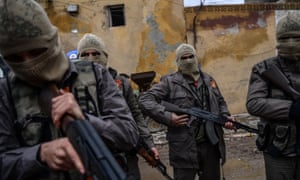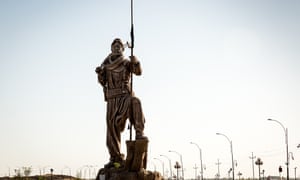Gareth Stansfield
In whichever state they live, the Kurds endure a perilous existence. In Iran, the Kurdish people of the west have suffered significant persecution at the hands of the Islamic republic, while in Iraq, the Kurds of the north were confronted with a well-organised military operation. They also faced a diplomatic initiative that illustrated that, even in the fractious world of Middle East politics, Kurdish aspirations can manage to unify Iraq, Iran and Turkey in common opposition, following the independence referendum.
Even more strikingly, western powers were also aligned against their Iraqi Kurdish allies who had been so valuable in the fight against Isis. The thinking of western governments was logical – coolly objective even – as they remained committed to their policy of protecting the territorial integrity of Iraq. But, from a Kurdish perspective, they seem to be useful proxies when needed – and friends to forget when not.
This pattern is again playing out in the far north of Syria, in Afrin, controlled by the Kurdish Yekineyen Parastina Gel (YPG) and their political partner, the Democratic Union party (PYD). For Turkey, these groups are synonymous with the PKK, proscribed in Turkey and in western countries as a terrorist organisation. The groups, by contrast, claim they are wholly Syrian and are committed to Rojava, as they call the region, being autonomous within a future federal Syria. They are also committed western allies in the fight against IS.
 The problem with these arguments is that they all contain an element of truth. No matter how persuasively leaders of the PYD claim that they are not part of the PKK, circumstantial evidence would suggest otherwise. This is not a surprise. The PKK had previously been based in Syria and the government of Syria had embraced a policy over many years of encouraging Kurds there to join the PKK. One day, these fighters were going to return home. So, while this does not mean that the YPG is the PKK, it’s understandable why Ankara would make the claim.
The problem with these arguments is that they all contain an element of truth. No matter how persuasively leaders of the PYD claim that they are not part of the PKK, circumstantial evidence would suggest otherwise. This is not a surprise. The PKK had previously been based in Syria and the government of Syria had embraced a policy over many years of encouraging Kurds there to join the PKK. One day, these fighters were going to return home. So, while this does not mean that the YPG is the PKK, it’s understandable why Ankara would make the claim.
However, the Kurdish groups have proved themselves politically responsible, administering their territories in the chaotic setting of post-2011 civil war Syria. And militarily, the YPG seemed to have turned into the Middle East’s equivalent of the Spartans. With limited equipment but an abundance of discipline and sheer belief, the forces fought a dogged and ultimately successful defence of Kobane, which history will view as the moment the tide turned against IS, which had, until them, seemed virtually unstoppable.
Then, as the core of the Syrian Democratic Forces, they rolled back Isis village by village, not only across the north-east of Syria, but also down the border with Iraq as far south as Deir ez-Zor province. Working with western, and especially US, military forces, the Kurds gained experience and skills that would bolster their already fearsome standing.
In short then, from a western perspective, Nato-ally Turkey does have a point, but then so too do the Kurdish anti-IS allies. When faced with having to make an almost impossible choice, it is perhaps easier to opt to do the bare minimum. But Afrin is not a battle that western governments can ignore as easily as they did the Kurdish referendum in Iraq.
At the immediate tactical level, the battle-hardened Kurds are already inflicting serious damage upon Turkey’s proxy forces. Will the military forces of Turkey have more success? It is unlikely or, at least if they do, it will come at a very considerable cost. The Turkish military is still recovering from the failed coup of July 2016 against President Erdoğan. If Turkish forces, or even their proxies, become bogged down in a bloody fight in Afrin, it is Erdoğan’s judgment that could be called into question by a population that he himself has made more nationalistic and anti-Kurdish.
Furthermore, the Kurds of Turkey could exploit an upsurge in Kurdish militancy and intensify their insurgency. Such a ramping up of Kurdish nationalism would also be evident in Iraq and Iran. With a rising insurgency beginning with the success – or even noble failure – of the defence of Afrin, a broader Kurdish revolt against their host states and allies is not beyond the realms of possibility.
This possible Kurdish domino would be transformative and unpredictable, even putting in play the very boundaries of the Middle East state system. There is also a further possible domino, already threatened by Afrin and of even greater concern to the west: its effect on the cohesion of Nato.
For Russia, involvement in Syria offered an opportunity to undermine the integrity of Nato, to further Russian interests in eastern Europe, the Baltic, and perhaps beyond into other theatres. With Russia seemingly helping Turkish operations in Afrin – by granting permission to use the airspace and openly condemning the US for its “unilateral”actions in strengthening the YPG – Moscow could claim to have at least part-orchestrated a beautifully conceived plan. Two Nato members – the US and Turkey or at least their proxies – could end up pitched into a very bloody and protracted conflict.
Events in Afrin are therefore not solely about the future of the Kurds in the north of Syria. Far from it. They could transform the region – Turkey, Iraq and Iran in particular – and have profound consequences for the west as it confronts the challenge of an increasingly influential, dynamic and capable Russia.
It’s time for the west finally to face an uncomfortable question – what is it that they want to achieve in the Middle East, beyond glib statements promoting peace, stability and democracy? Sure, it’s a fantastically difficult question, but it needs to be answered. In the absence of an answer, the events unfolding in Afrin, and what might follow, will continue to throw up consequences that can only benefit the interests of others.


No comments:
Post a Comment